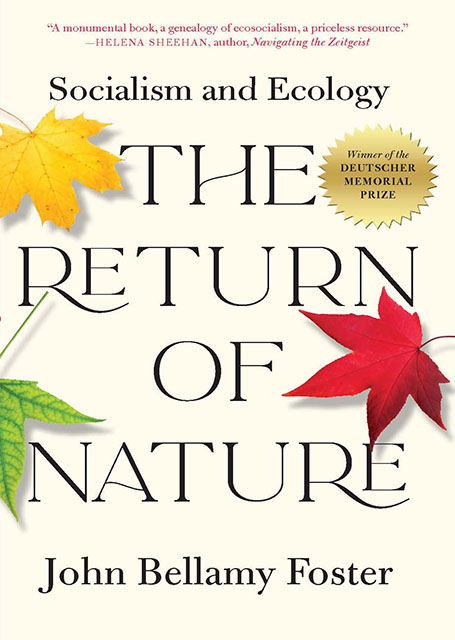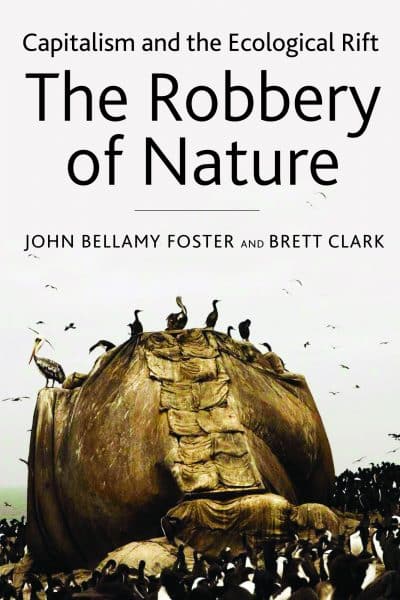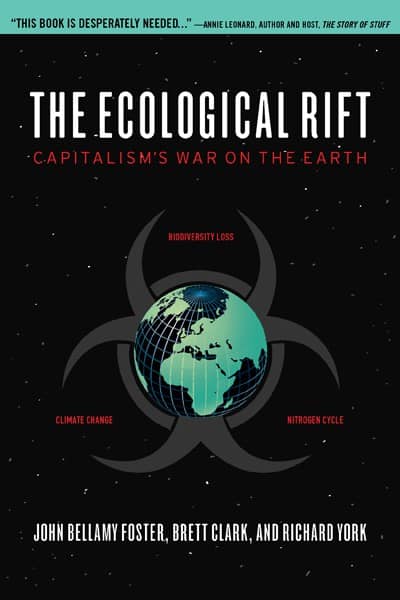In the week before the COP26 international summit, John Bellamy Foster analyzed the climate emergency and how we can achieve climate justice.
Foster divided his talk into three parts:
1. The planetary emergency
2. Marxian ecology and what is has to bring to bear on the subject
3. The ecology of the future
To paraphrase John Bellamy Foster’s lecture:
Officially we’re still in the Holocene epoch, which goes back 11,700 years. We have lived in a fairly benign climate and environment — but science has concluded, although it’s not official, that that epoch is over. The usual markers are the first nuclear detonation in 1945 followed by the dropping of the first atomic bomb on Nagasaki that same year, the radionucleids that were left behind after the testing of Hydrogen bombs in the 1950s, and another marker is the proliferation of plastics.
There is an anthropogenic rift in the biogenic cycles of the planet. Science has defined nine planetary boundaries regarding what constitutes a safe planetary home for all of us on the planet (in other words, the holocene), and we are crossing almost all of them:
1. Climate change
2. Ocean acidification
3. Depletion of ozone layer
Individually, each of these are planetary emergencies which all have one common denominator: The capitalist economic system. Even if we deal with one of these emergencies, we have to deal with the rest.
It is important to understand that climate change is only part of the problem. But the 6th assessment report of the United Nations published in early August — including Part 3 (mitigation) and Part 2 (impacts), both leaked early — makes clear how much we’re trouble we’re in on that front alone. (FYI: The reason the IPC leaks are occurring is that we’re in such a serious situation that scientists from within COP26, acting through Science Rebellion (attached to Extinction Rebellion), acted to get out the science-approved data in time for potential political action, but before various governments could censor it.)
Of the 5 socio-economic scenarios that the IPCC dealt with, the first, SSP1.9 is the best we can hope for, according to the science: that is, the only scenario in which we find ourselves below 1.5 degrees increase in global average temperatures. To conform to this optimistic scenario, carbon dioxide emissions have to peak in 4 years – we have to hold off reaching 1.5 degree C increase until 2040. We no longer can stay under 1.5 for a whole century. We have to have net zero carbon emissions in 2050. Note that we used to think that 2 degrees was the point of no return.
The 5th scenario is the most apocalyptic, and that is SSP20.5, the one we are most likely to be headed for. In this situation, the best estimate is that we will be at more than 4.4 degrees higher than global levels. The science tells us that we cannot maintain industrial civilization at this level, and if that occurs, state structures will crumble completely. This is the situation we are faced with. What’s interesting about the leaked portions of the report is that they focused on impacts and mitigation, the portions that would have been least likely to reach the public fully uncensored. Part 2 tells us that during the 6th extinction, other species may be able to evolve beyond this, but we will not. We can kill ourselves and almost every other species off, and while life will come back, the human species will not.
Part 3 represents a fundamental shift in terms of the view of the IPCC: We won’t make it with Scenario 1, but even with Scenario 2 (with 2 degrees as the guardrail), we won’t survive unless we make fundamental change in our socio-economic system. This tells us that we need to carry out the equiv of a neological revolution. Previously the IPCC’s orientation was towards seeking technological solutions – technologies that don’t alter capitalistic social relations and allow us to maintain social relations as they are. This report says that tech can’t get us there. Right now wind and solar account for 7 % of wind and energy use and nuclear power shouldn’t be pursued and couldn’t solve the problem, and they’ve shifted to a demand-side approach, as suggested in de-growth circles. In arguing for the almost immediate closing of all coal-fired plants, more sustainable cities relying on mass transit, and a just transition for the working classes and even more vulnerable populations, they point out that 46% of GDP from less developed countries should be counted as emissions from the Global North. They reference figures like Jason Hickel, Andreas Malm, Jorgenson, etc, people coming from an ecosocialist analysis, even pointing in the direction that capitalism is unsustainable altogether…..
….We’re at threat of breaking “the chain of human generations,” as Marx once said. Let’s go beyond Marx, who said that the point is not to understand the world, the point is to change it — if he were alive today that he might have said: the point is to change it before it is too late…. It’s time to raise the relevance of a materialist approach to fighting for survival, to point to the possibility of an environmental proletariat — perhaps highlighting Engels’ discussion of capitalism’s epidemiological impacts.
Herein a materialist approach means: people who are fighting for not just their jobs and housing, but food and water, and basic health, understanding that these things are all connected, that expropriation of our resources and our labor, and enslavement in various ways, are tied together. These are struggles not just for freedom, but out of necessity. This is a crucial way of understanding our time – the fight for all of these things at once.
Some on the left have said we should call the times we live in the “Capitalocene,” as opposed to Anthropocene. This is a failure to understand the critical nature of the Anthropocene, as occurring in context of an ecological crisis. What defines it is that for the first time in planetary history, human beings — anthropogenic factors — are the major force of change in the entire earth system. And that’s going to stop. If we follow down the path we’re on now, headed to a 4.4 degree increase, the fifth Scenario, what we’re talking about is the 5th extinction, which will take all humanity with it. The Anthropocene will continue to exist so long as industrial civilization exists, humans will continue to be on the razor’s edge where we are the main factor in earth system change. The “Capitalocene,” as an age, doesn’t confront that. Well, what comes after the Capitalocene?
Right now we are in the Meghalayan age of the Holocene, which goes back 4,200 years, officially. This coincides with the major crises of human civilization associated with climate change. Brett Clark and I decided to named this the “Capitalinian,” a geological age rooted in capitalism, and capitalism’s destruction of the earth, such that capitalism has become destructive to the entire earth system. We argue that by 2050, we have to shift to new age of ecological sustainability and substantive equality, that can only occur through an ecological revolution waged by the ecological proletariat. This builds on work addressing the specific ways that the Global South is being affected in “Imperialism and the Anthropocene” co-written with Hannah Holleman and Brett Clark…..





Comments are closed.